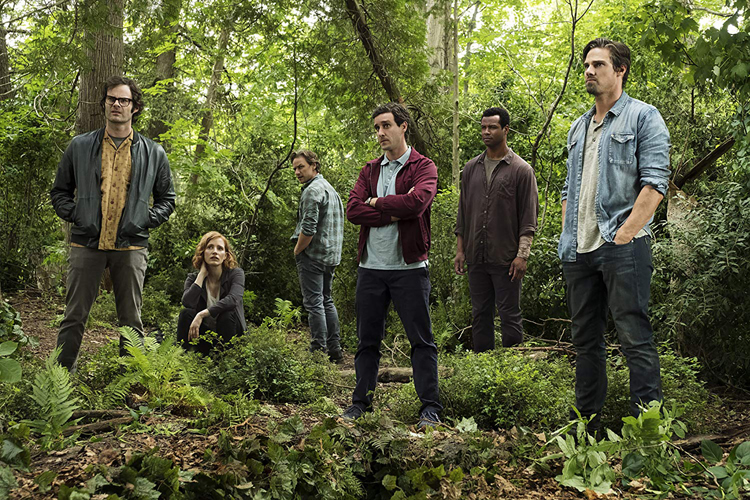A number of book adaptations have been needlessly split into two movies—the final entries of Harry Potter and The Hunger Games come to mind—but if any book needed bisection, it was Stephen King’s It. The novel is over a thousand pages long. Trying to cram all that plot into one movie would be like, I don’t know, Pennywise eating a whole child in one bite. So, in a smart move, the first It started us off with just the meat: a chewy, digestible story about kids fighting an evil clown. And what an excellent feast it was! But now it’s time for the bones of the tale: the kids are all grown up, not remotely alright, and ready to face It Chapter Two.
It’s been 27 years since the events of the last film, and the members of the Losers Club have moved on with their lives—well, most of them. Mike, the only one who stayed in Derry, has spent his entire adult life researching the town monster. Everyone else relocated and lost their childhood memories somehow. But when gruesome things start to go down in Derry again, Mike realizes that he has to get the gang back together, or else Pennywise will have lots of tiny graves to dance on.
But a key person is missing from the reunion—screenwriter Cary Fukunaga, the mind behind triumphs like Sin Nombre and Beasts of No Nation. Fukunaga co-wrote the first It, but his name is conspicuously absent from the script for Chapter Two. This time around, the sole screenwriter is Gary Dauberman, the mind behind… four of the Conjuring universe spin-offs. Comparing the two writers may sound some alarm bells.
Thankfully, Dauberman succeeds at continuing one of the first film’s greatest strengths: devotion to the tone of Stephen King’s novel. It plumbed the darkest depths of fear—the murder of children is a central plot point, after all—and Chapter Two retains the novel’s blend of body horror, trauma, and deflective humor. It feels like a natural extension of 2017’s It. While both films nail the tone of the book, they sacrifice the complexities of its subtext in order to maintain broad horror appeal, which is far worse of a problem amid the more adult themes of Chapter Two.
This disconnect is most evident in the movie’s treatment of homosexuality. Chapter Two begins with the brutal, non-supernatural murder of a gay character — based closely on the real-life murder of Charlie Howard—but the movie has little interest in exploring the novel’s relationship between fear and hate, and how synthesis of the two bloodies the bodies of the marginalized. Instead, it uses homophobia for a violent intro and an implied character twist, and discards any serious treatment of the issue. It’s ugly and exploitative.
The sin that undoes the movie, though, is boredom. It Chapter Two clocks in at nearly three hours long, and it’s structured to feel even longer. Throughout the first two hours, there are flashbacks to events that happened off-screen in Chapter One or in between the two movies—it’s like you accidentally skipped an episode of a TV show and had to be filled in by the recap at the start of the next one. Chapter Two zigzags around enough material to fill two movies of its own. King’s novel jumped between past and present as well, but it did so poetically rather than haphazardly. Chapter Two just uses its flashbacks to foreshadow what happens in the very next scene.
While the plot drags on and on, the movie sporadically remembers that it’s supposed to scary, as if it were meeting a scares-per-hour checklist. But the perfunctory frights become too predictable: things will get tense, there’ll be a brief moment of silence, and then a gangly CGI monster will burst onto the scene and wobble around a bit. As Chapter Two crawls toward its climax, the monsters just get ganglier and wobblier, culminating in a CGI cacophony that’s like the end of the first movie but more expensive. It’s not scary; it’s flashy.
Can the cast save us from this tedium? There’s been a lot of talk about Bill Hader’s performance, but here’s the bad news: he’s not any better than the rest of the cast. And here’s the good news: the main cast is excellent all around. We tend to bare our souls in the face of fear, and the actors here run the range of human emotion pretty convincingly. They’re so good, and their chemistry so palpable, that you’ll want to give them what they sorely lack: a movie that matches their efforts.
★★½ (2.5/5)




